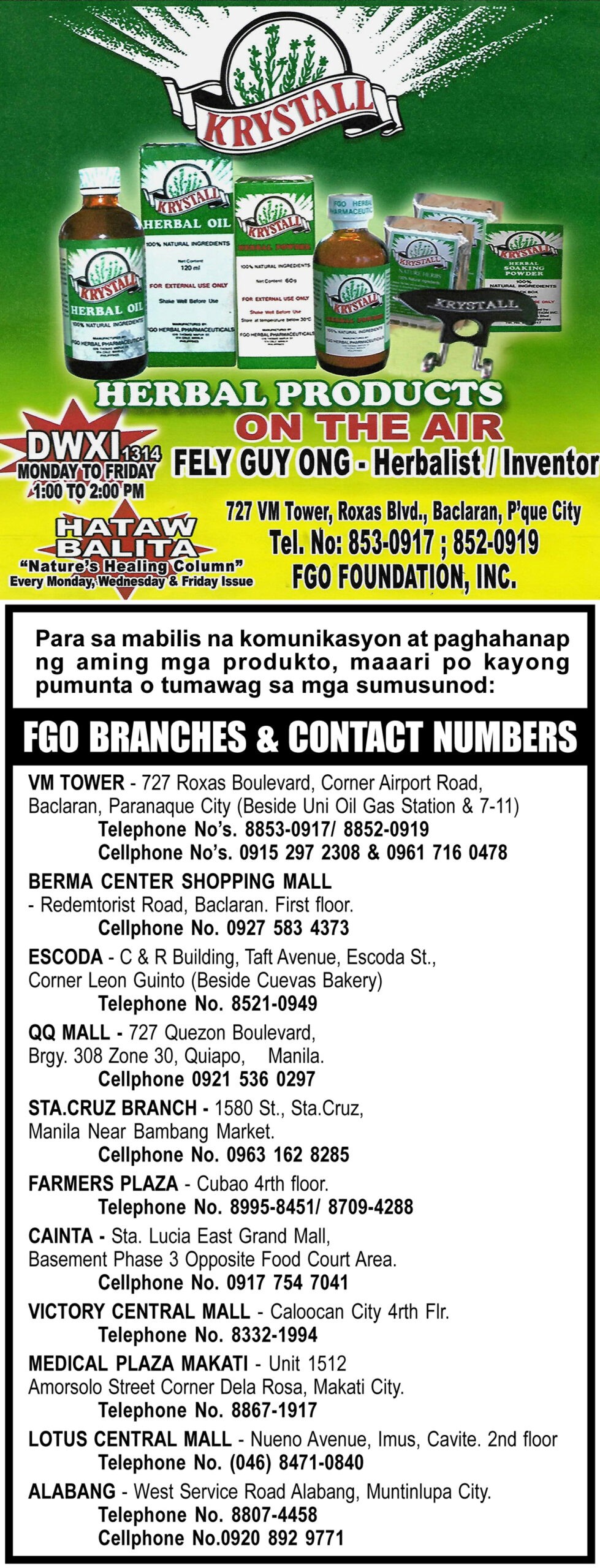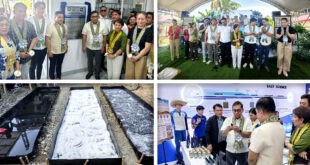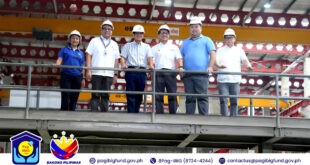TEMPORARY storage para sa “overstaying o abandoned goods.” Ito ang pinaplanong ipatupad ng Bureau Customs (BOC) ngunit, ang nakababahala sa plano ay maaaring magbubunga ng korupsiyon at ang mas matindi ay maaapektohan ang presyo ng mga produkto sa katagalan.
Posible nga namang tataas ang presyo ng mga produkto at ang sasalo at magdurusa nito ay mga konsyumer.
Kaya, nabahala ang mga negosyante sa pantalan, kabilang rito ang grupo ng mga dayuhang kapitalista, sa masamang idudulot ng planong ito.
Ang draft ng Customs Administrative Order ay tinalakay sa isang forum ng BoC nitong 8 Hun-yo, na magpapatupad sa Section 307 ng Customs Modernization and Tariff Act na ginawa da-lawang taon na ang nakalilipas.
Ang mga dumalo sa forum noon ay mga kinatawan mula sa Cargohaus Inc., DHL Express, ICTSI, Paircargo, UPS, Authority of the Freeport Area of Bataan, Association of Petrochemical Manufacturers of the Philippines, Asian Terminals Inc., Association of International Shipping Lines, PricewaterhouseCoopers Philippines, at Philippine Skylanders International Inc.
Kinukuwestiyon ng mga stakeholder ang probisyon na iminungkahi ng CAO, lalo ang paglagay ng Customs Facilities and Warehouses na anila’y mahirap imantina ang kaayusan gaya ng temporary storage facilities.
“This order shows how inefficient Customs is. The provisions contained in the draft CAO are asking for too much and what should be the BoC’s responsibility is unreasonably being transferred to the business sector,” pagkondena ng isa sa representatives na dumalo sa forum. Tumangging mapangalanan ang representante sa takot na sila’y pag-initan.
“We are all alarmed at the misguided steps being taken in the guise of modernization,” dagdag ng source.
Ang kautusan ay sisira sa pundasyon ng Philippine Ports Authority, ang tunay na may supervision sa port terminals, na maaring italaga bilang CFWs.
“The PPA needs to weigh in on this, too. The PPA still exists and the designated CFWs are PPA premises. No law has been enacted to change that. Cargo handlers also pay a fixed fee for each square meter of the port terminal, and that does not cover the proposed ‘temporary storage faci-lity.’ They have to change all existing contracts, or abolish PPA instead,” pahayag ng source.
Ang Section 4.2 ng proposed CAO ay nagsasaad na lahat ng hiwalay na temporary sto-rage facilities ay maging bahagi ng BoC at dapat ay sa ilalim ito ng kanyang supervision.
Ang draft CAO ay nangangailangan din ng CFW operators para magkaloob sa lahat ng kailangang cargo moving trucks at equipment pati na ang physically transfer at seguridad ng mga produkto.
Ang BoC ang magsasabi sa mga bayarin at kung magkano ang babayaran sa temporary sto-rage facilities.
“But the BoC must remember there is a port or warehouse tariff and in some cases government share on the use of terminal facilities and equipment. If the BoC imposes its own fees and charges, importers will be charged double, which will be passed on to consumers. The order does not only discourage foreign investors, it also threatens to jack up prices of commodities,” sabi ng source.
“Cargo handling services are not free, and all relevant fees should be shouldered by the BoC. Fees and other charges are all governed by existing PPA rules.”
Sa ilalim ng kautusan, ang produkto na pansamantalang nakaimbak ay dapat nasa ilalim ng customs procedure, auctioned, condemned o re-exported sa loob ng 90 days pagkatapos ng due notice mula sa pagkakaisyu ng order of abandonment.
“This whole idea smacks of corruption – stay in the Temporary Storage Area until we’re able to make ‘areglo.’ But what happens after 90 days? Every day there is a number of containers whose status change from ‘live’ to ‘abandoned.’ If the temporary storage facility is full, what happens to those containers? The number of overstaying containers fluctuates so a finite number of slots for temporary storage does not make sense,” diin ng stakeholder.
Sakaling mawala, masira at mabulok ang produktong nakaimbak dahil sa kapabayaan at maling paghawak ng handlers ng cargo, nakasaad sa draft CAO na ang operators ang mananagot sa pagbabayad sa duties and taxes.
Sinabi ng source, sa halip maglagay ng temporary storage area sa loob ng ports, ang dapat gawin ng BoC ay maghanap ng malaking lote sa labas ng Metro Manila na lahat ng containers ay doon ilalagay pagkatapos mag-isyu ng order of abandonment na karaniwang ginagawa sa ibang developed countries.
Sa parte ni BoC Commissioner Nicanor Faeldon, ipinagtanggol niya ang draft order. Aniya’y bahagi ito ng Customs modernization program bagama’t ikinokonsidera niya ang posisyon ng key stakeholders.
“We are still in the consultation stage before rolling out the implementing rules and regulations.”
AKSYON AGAD – Almar Danguilan
 HATAW! D'yaryo ng Bayan hatawtabloid.com
HATAW! D'yaryo ng Bayan hatawtabloid.com





















